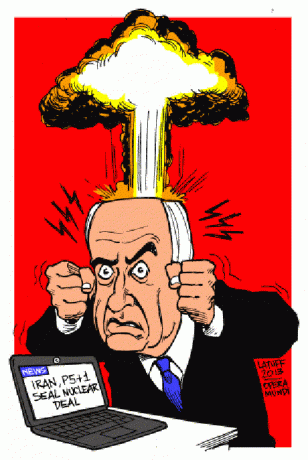News
You are here
Iran's nuclear deal: a hope for peace

August 1, 2015
After 12 years of standoff, Iran, the United States and other members of the P5+1 struck a historical deal on July 14 to replace hostility with diplomacy and eliminate the possibility of another devastating war.
On the same day, Israeli Prime Minister Benjamin Netanyahu told the press that the nuclear deal signed with Iran is “a stunning historic mistake.” Netanyahu keeps reminding the world about the threat Iran poses to Israel and basically everyone else. During his first speech to the congress, in 1996, he called Iran “the most dangerous regime in the region,” and warned about its ambition to obtain nuclear weapons. Twenty years later, he continues the same rhetoric and insists on military response, which is described as “adventurous delusions” by former Prime Minister Ehud Olmert, who also opposes Netanyahu’s views.
Hardliners
While many Iranians, along with the international community, are celebrating the victory of reason and peace, it is not surprising that Netanyahu’s grim vision has some support amongst the hardliners—be it in Iran or the United States. The most recent example is the reaction of Iran’s Revolutionary Guards, who denounced a UN Security Council resolution that endorsed last week’s nuclear deal. Top revolutionary Guards commander Mohammad Ali Jafari was quoted as saying “some parts of the resolution draft are not acceptable for us since they have clearly crossed the Islamic Republic’s red lines, especially in regards to our military capabilities.” Commander Jafari’s comments may sound as being in line with the Supreme Leader’s previous position, since after the agreement he has not taken a clear position; but it may stem from the fact that when sanctions lift his organization will lose billions of dollars of annual revenue from smuggling goods into the Iranian markets.
The US Republican presidential candidates like Lindsey Graham, Donald Trump and Scott Walker are also attacking Obama’s nuclear deal, proving that they have learned nothing from George W Bush’s catastrophic foreign policy. The war-hawks are now in a race to prove who can offer the least understanding of this delicate situation and the most aggressive solution to it. A race front-runner, Scott Walker, has gone so far to declare that he is “prepared to launch war with Iran on his first day as president.”
Shabtai Shavit, former Mossad chief, who in an interview with US radio broadcaster Aaron Klein on July 19 suggested that the nuclear deal with Iran offers Jerusalem an opening to join “a new Middle Eastern order,” presents another provocative view: “Israel now has even more impetus to make common cause with Sunni Arab countries like Egypt, Jordan and Gulf sheikhdoms that are nervous over the West’s overtures towards their common nemesis, Iran” he said.
Almost two weeks after the agreement, the joy and optimism continues to be the general mode of Iranians around the world. They are not celebrating the agreement as the achievement of the regime, but rather as a ray of hope, no matter how small. Many also believe that the new era will improve the Iran’s shady human rights record. Time will tell if they are right in their assessments.
Section:
Topics:









